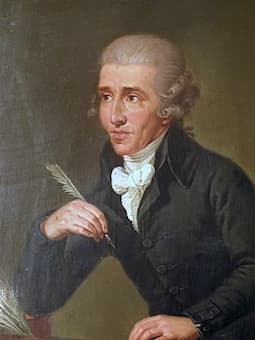
Joseph Haydn, c.1770
The village of Rohrau steadily grew from a Roman road and river crossing to support a castle built in the Middle Ages. When the village was attacked in the early 18th century by “a peasant army of the anti-Habsburg Hungarian party,” a certain Lorenz Koller was in charge of the settlement as the de facto mayor. Said Lorenz Koller, born in 1675 turns out to be the maternal grandfather of Joseph Haydn. Anna Maria Koller, Lorenz’s daughter and Haydn’s mother had been employed as a cook at the castle. She met and married Mathias Haydn, a master wheelwright who also served Rohrau as mayor. Joseph later wrote, “his father was: a great lover of music by nature, who played the harp without reading a note of music; his mother sang the melodies.” In fact, all three of the surviving male children became professional musicians. There are some reports that “all the children had to join in neighborhood concerts organized by their father, and to learn songs, and to develop their singing voice.” The composer’s birth home, which is also the birth home of his brother Michael, has been turned into a museum. Rohrau already erected a monument to Haydn during the composer’s own lifetime, and you can still see it in the center of the village today.
Joseph Haydn: Missa Brevis in F Major
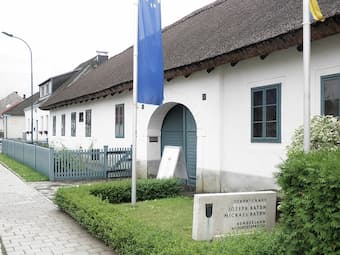
Haydn’s birthplace in Rohrau, Austria
Haydn grew up in an area of considerable ethnic diversity, close to the neighboring federal state of Burgenland, which had been part of Hungary until 1921. Rohrau was once a border checkpoint at a river crossing into the Hungarian part of the Austrian Empire. Haydn apparently showed great talent at an early age. According to Haydn, “as a boy of five I sang all my father’s simple easy pieces correctly… Almighty God… granted me so much facility, especially in music, that when I was only six I boldly sang masses down from the choir loft, and could also get around on the harpsichord and violin.” At some point in 1737 or 1738 Johann Mathias Franck, a cousin of Mathias Haydn’s by marriage and a school principal in the nearby town of Hainburg, heard Haydn sing in the family circle. Apparently, Franck was so impressed by Haydn’s voice and musical accuracy that he suggested that he come to live with him, “so that there I could learn the rudiments of music along with other juvenile necessities.”
Joseph Haydn: Keyboard Concerto in C Major, Hob.XVIII:1 (Iain Quinn, organ; Arcangelo; Jonathan Cohen, cond.)
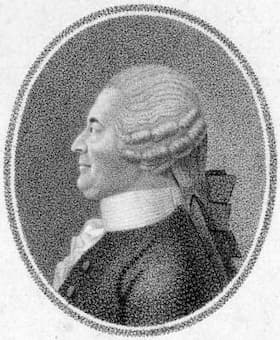
Georg von Reutter
Haydn’s parents accepted Franck’s proposal, and six-year-old Joseph joined Franck’s household. Franck was not only a school principal but also the choir director at the Hainburg church. A foremost Haydn biographer writes, “The young lad received instruction in reading and writing, in the catechism, in singing, and on almost all the string and wind instruments, and even on the timpani.” Haydn later related, “I will be grateful to this man even in the grave that he taught me so much, even though in the process I received more beatings than food.” Clearly, life wasn’t easy as Haydn remembered “being frequently hungry and humiliated by the filthy state of his closing.” In 1739, Haydn’s singing caught the attention of Georg von Reutter, the director of music at St. Stephen’s Cathedral in Vienna. Reutter had been to Hainburg for a visit and was looking for new choirboys. Haydn passed the audition, and after some additional training moved to Vienna in 1740. For the next nine years, Haydn would work as a chorister.
Joseph Haydn: Keyboard Sonata (Divertimento) in E-flat Major, Hob. XVI:16 (Christine Schornsheim, harpsichord)
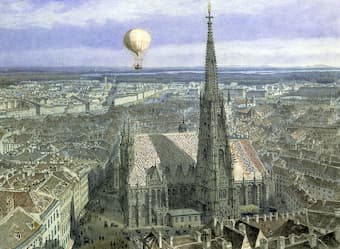
St. Stephen’s Cathedral in Vienna, 1847
Haydn was placed in a boarding house next to the cathedral, along with Reutter, Reutter’s family, and the other four choirboys, which after 1745 included his younger brother Michael. “I sang soprano both at St Stephan’s and at court to great applause,” Haydn reports. “At the choir school, I was taught the art of singing, the harpsichord and the violin by very good masters.” Seemingly, Haydn received very little formal training in theory or composition, and he worked his way through the counterpoint exercises of Carl Philipp Emanuel Bach, and the encyclopedic treatise by Johann Mattheson. Most important, however, was the fact that he rehearsed and sang in performances “of the greatest art-music then being produced in Catholic Europe, amid the pomp and splendor of the cathedral and court of an imperial city.” When Haydn’s voice broke, the Empress Maria Theresa complained to Reutter that he was singing “like a crow,” while praising his brother Michael. Reutter suggested that Haydn might become a castrato, but his father refused permission.
Joseph Haydn: Salve Regina in G minor
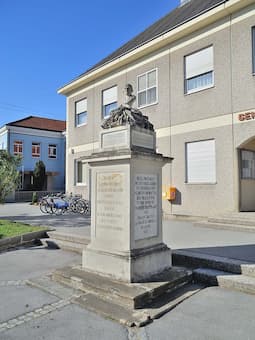
Joseph Haydn monument in Rohrau, Lower Austria, Austria
Haydn seems to have been a little prankster, and when he snipped off the pigtail of a fellow chorister he was first caned, summarily dismissed and sent into the street. Haydn writes in his autobiography, “When my voice finally broke, for eight whole years I was forced to eke out a wretched existence by teaching young people. Many geniuses are ruined by this miserable need to earn their daily bread, because they lack time to study. This could well have happened to me; I would never have achieved what little I have done, had I not carried on with my zeal for composition during the night. I composed diligently, but not quite correctly, until I finally had the good fortune to learn the true fundamentals of composition from the famous Porpora (who was in Vienna at the time). Finally, owing to a recommendation from the late Baron von Fürnberg (who was especially generous to me), I was appointed as director with Count Morzin, and from there as Kapellmeister with his highness Prince Esterházy.”
For more of the best in classical music, sign up to our E-Newsletter
Joseph Haydn: String Quartet Op. 1, No. 1
